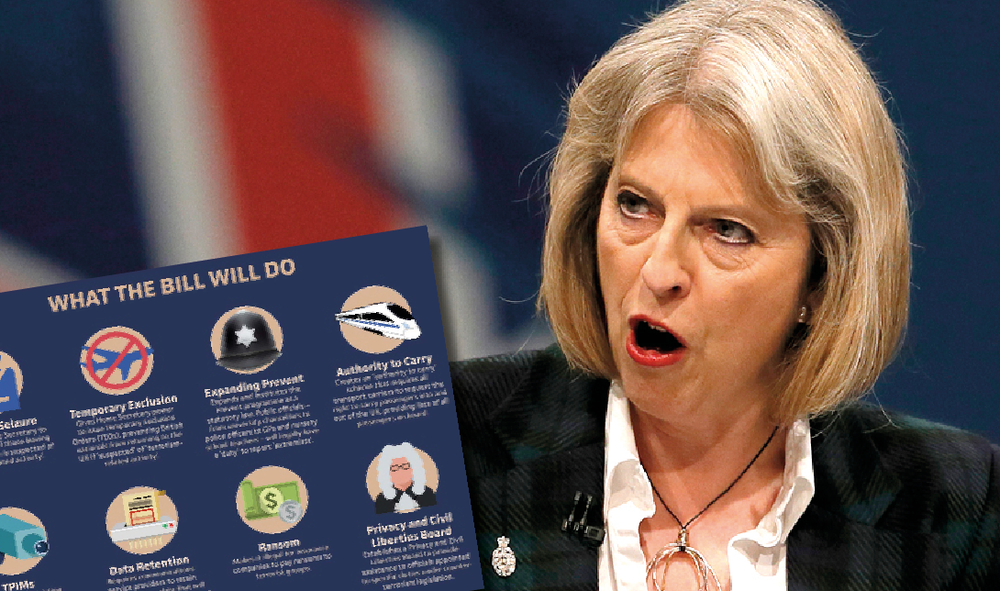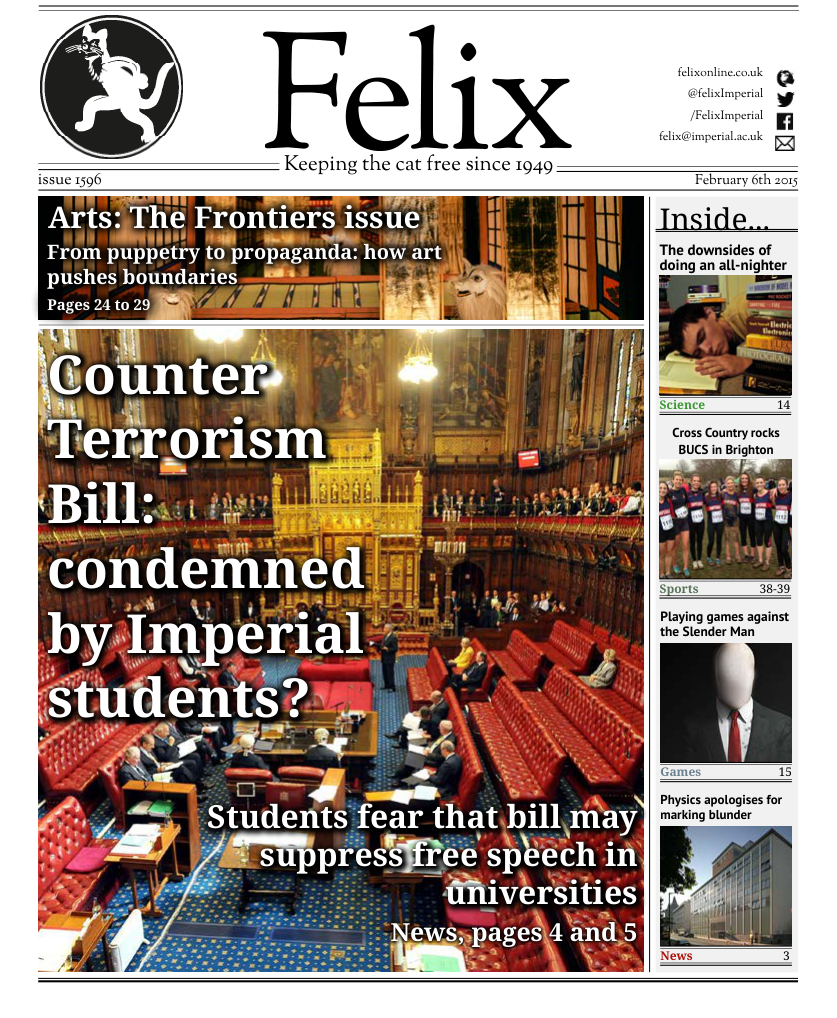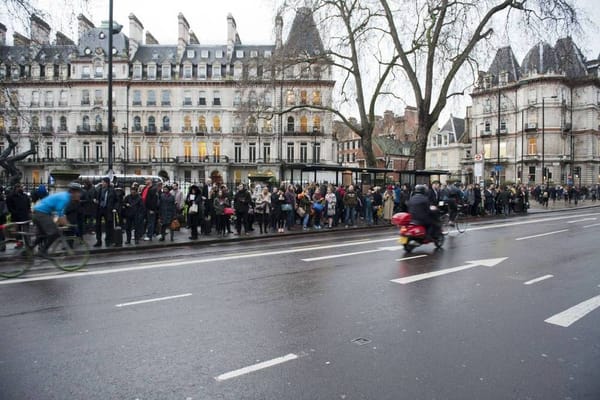Students take to Council to condemn Counter Terrorism bill
Philippa Skett looks at the controversial bill that may be a threat to free speech in universities

A bill being passed through government has come under fire for potentially supressing free speech at Universities, and now two students want to pass a paper through Imperial College Union Council, condemning the bill altogether.
The Counter Terrorism and Security Bill was read in the House of Lords earlier this week, and has caused controversy amongst students and academics alike. The bill addresses a number of strategies to potentially stifle terrorism activity and influence, but seeks to make a number of currently optional approaches for Universities compulsory.
The bill proposes that the Secretary of State should also issue guidance to institutions on how such duties should be fulfilled, and tell institutions what direct actions should be taken. They can invoke action by court order if necessary.
One part of the bill, called “Prevent”, aims to place statutory duty on institutions such as Universities to prevent students being drawn into terrorism, “including non-violent extremism.”
Actions suggested by Prevent that Universities should take include introducing strict policies and procedures to manage campus events, including the booking of speakers.
Colleges or Unions should also investigate the content of presentations before given to students if by external speakers, and monitor the IT use of students. They should also be able to limit what students can access through their network, and introduce policies to determine what sort of research should constitute concern when browsing online.
The paper drafted against the bill for Union Council, authored by two members of the Islamic Society committee, will be debated next Tuesday. It states that the bill may “create a culture where students are unwilling to speak out,” and suggests that academics should not have to spy on students and their activities.
The paper proposes that the Union should agree that: “That by risking the ability of a scope of events taking place from controversial speakers to student led events, the bill will simply drive certain activities off campus where they are currently held and regulated and as such any radical elements will be allowed to flourish unchecked without oversight that is now currently in place.”
It also suggests that the Union should agree that: “The implementation of the Prevent strategy on campus will not only isolate Muslim students but undermine the civil liberties of other groups such as environmental, political and humanitarian activists.”
Another belief of the paper is that the best way to counter extremism to simply expose it through academic discussion.
Felix spoke to the iSoc President, Ibtesham Hossain, who said that the bill will have widespread implications for all students, regardless of religion. Hossain said: “The Counter Terrorism Security Bill is a dangerous legislation that, ironically, is ‘extremist’ and threatens core ‘British values’.”
“In trying to thwart the former and promote the latter, the government’s blanket approach not only has serious implications for freedom of speech and the ability to challenge and debate ideas in a university setting, but also creates a culture of suspicion between academics and students.”
Currently, if student societies want to book a speaker, they must inform the Union about the speaker: what organisations they are linked with and if there have been any difficulties or threats when they have spoken in the past. Publicity for the speaker must generally also be attached, and all of this must be provided to the Union no less than three weeks prior to the event.
The speakers are also authorised by College security, and any potential risks are flagged to authorities within the College.
Felix spoke to the current Deputy President (Clubs and Societies), Abi de Bruin, who currently authorises external speakers at the Union level, she told us: “In most situations we can work to let these events take place. We may have to put some precautions in place, such as additional security measures for high profile speakers, but the vast majority are not a cause for concern.”
The government released the outlines for the new Prevent scheme back in December, and asked institutions to email their responses to their call for consultation. Some of the officer trustees responded in one document, and College responded separately and they have refused to release the document to Felix before the print deadline.
de Bruin said in the officer trustee response that although they “broadly agree” with the concept of the new Prevent scheme, but have reservations about how vague some parts are, such as the lack of definitions for terms such as “vulnerable individuals” and “fundamental British values” that are referred to throughout the scheme.
The Council paper highlights the vagueness of the bill, and criticises it as it puts Students’ Unions at risk since they are legally expected to monitor events that are undefined. The papers points out that the proposals will not help Unions in controlling extremist action, and will instead cause events to be held outside the University environment where into forums where there is no oversight.
Student Unions from School of Oriental and African Studies (SOAS), University College London, Kings College London, Queen Mary’s University and London School of Economics have already passed motions condemning and disassociating itself with the bill.
The National Union of Students also denounced the bill as “Further developing a culture of suspicion and surveillance on campuses, whilst also potentially conflicting with institutions’ duties to promote freedom of speech, by making them overly risk-averse and unwilling to engage in important topics of discussion.”
In an open letter published by the Guardian, over 500 professors from institutions across the country, including Imperial, have condemned the bill as “unnecessary and ill-conceived,” stating that the bill is inflicting “Draconian crackdowns” in a bid to tackle the extremism.
Last week, Imperial’s Chair of College Council, (the highest decision-making body of Imperial College London), and former head of M15, Baroness Manningham-Buller also voiced concerns on the bill, during a debate in the House of Lords last week.
Said Manningham-Buller: “There is a profound irony in seeking to protect our values against this pernicious ideology we are trying to bar views too vaguely described as non-violent extremism, which falls short of incitement to violence or to racial or ethnic hatred or the other legislative constraints on Universities.”
The bill was introduced by Theresa May, the Secretary of State for the Home Department, back in November, and has rapidly moved through the House of Commons and the House of Lords. Mrs May said of the bill during its second reading: “Today…the threat from terrorism is becoming ever-more complex and diverse.”
May hopes that with “cross party support” that it can be fast-tracked through Parliament before the general election next May, and hopes it will combat any threat from people joining the Islamic State in the UK, alongside combating other terrorist organisations too.
On Wednesday, the House of Lords agreed to include a Home Office amendment in the counter terrorism bill that states that colleges should still consider free speech when complying with other elements of the bill.
These approaches were introduced post 9/11 as part of the government’s counter-terrorism strategy, known as CONTEST. CONTEST included strategies for Preparing for an attack, Protecting the public, Pursuing attackers, and also Preventing radicalisation: known as the sophisticated sounding “Four P’s.”
The Prevent strategy remains deeply controversial despite the millions of pounds invested into it by the government. Initially there was division in what this should actually entail, but after 2005 and the 7/7 bombings, £80 million was spent on 1,000 schemes across 94 local authorities.
These schemes included paying for more CCTV cameras in areas with a high percentage of Muslim inhabitants, which caused uproar. They also include introducing community Prevent Officers, that liaise with institutions and are known to ask about any “issues” student unions may be having with their respective Islamic Societies.
The Prevent strategy was launched in 2007, but was re-launched in 2011 to refocus on University activity, after the “underwear bomber” Umar Farouk Abdulmutallab, was known to have been studying at UCL. He confessed and was convicted of attempting to detonate explosives hidden in his underwear whilst flying over from Amsterdam to Detroit.










